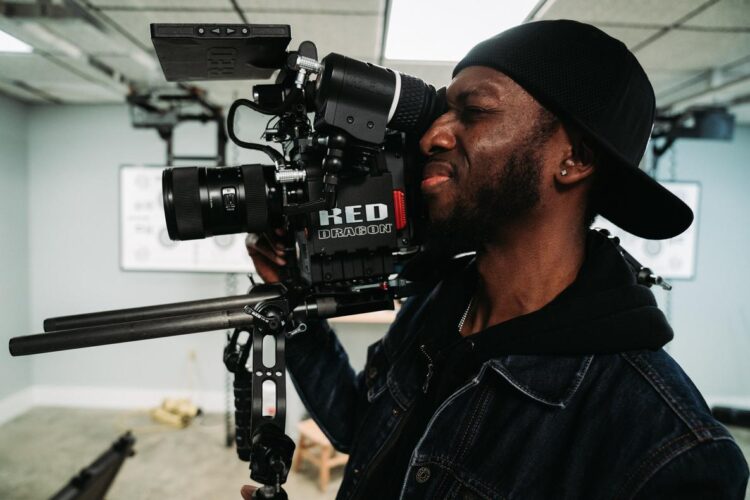When it comes to filmmaking and video production, are cinematographer and cameraman the same? While these roles are frequently used interchangeably, they have distinct responsibilities, skills, and creative contributions.
In this blog post, we’ll discuss the nuances of these two roles, their key differences, overlaps, and why understanding them is crucial for anyone aspiring to work in the film or video production industry.
Who is a Cinematographer?
A cinematographer, also known as a director of photography (DP), is the creative force behind the visual storytelling of a film. They are responsible for crafting the overall look, mood, and feel of a movie or video. Working closely with the director, the cinematographer decides on aspects such as:
- Camera angles
- Lighting design
- Lens choices
- Framing and composition
- Color grading
The cinematographer leads a team of camera operators, gaffers, grips, and other technical crew members. Their artistic decisions are central to the visual narrative, ensuring the final product aligns with the director’s vision.
Who is a Cameraman?
A cameraman, often referred to as a camera operator, is the individual responsible for physically operating the camera during a shoot. Their focus is on executing the shots as planned by the cinematographer and director. Key tasks include:
- Setting up the camera equipment
- Adjusting focus, zoom, and exposure
- Framing and capturing the scene
- Following directions from the cinematographer or director
While the role can involve a degree of creativity, the cameraman primarily executes instructions rather than leading the creative process.
Differences Between a Cinematographer and a Cameraman
1. Role in creative decision-making
The cinematographer is a high-level decision-maker. They shape the visual language of the film and collaborate extensively with the director. The cameraman, on the other hand, executes these creative decisions by operating the camera during the shoot.
2. Leadership vs. execution
The cinematographer is a leader who supervises the entire camera department. They work closely with lighting technicians, gaffers, and grips to achieve the desired look. Conversely, the cameraman is an executor who focuses on delivering the shots based on the cinematographer’s guidance.
3. Skill set and expertise
Cinematographers must possess a blend of artistic vision and technical expertise. They need to understand lighting design, color theory, and how different lenses and cameras affect the visual story. Cameramen, while also skilled, are more focused on camera mechanics and technical operation.
4. Scope of work
Cinematographers are involved throughout the pre-production, production, and post-production phases. They contribute to planning storyboards, testing cameras and lenses, and working on post-production color grading. Cameramen typically work during the production phase, capturing the shots as directed.
Overlaps Between the Roles
Despite their differences, the roles of cinematographer and cameraman overlap in some areas:
- Technical knowledge: Both roles require a solid understanding of camera operation, lenses, and lighting equipment.
- Collaboration: Cameramen work closely with cinematographers to achieve the desired shots. Effective communication and teamwork are essential.
- Attention to detail: Whether designing a shot or capturing it, both roles demand a keen eye for detail to ensure the visual quality of the film.
Cinematographer vs. Cameraman in Different Contexts
Film production
In high-budget films, the roles of cinematographer and cameraman are clearly defined and separate. The cinematographer oversees the visual style, while the cameraman focuses on executing the shots.
Television
In television production, especially for live broadcasts, the distinction can blur. Cameramen may have more creative input, and cinematographers might not always be involved in live shoots.
Independent films and low-budget projects
In indie films or smaller productions, the cinematographer often doubles as the cameraman due to budget constraints. This requires them to juggle creative vision and technical execution.
Documentaries
For documentaries, the cameraman often plays a larger role in decision-making due to the unpredictable nature of the shoot. Cinematographers may set initial guidelines but rely on the cameraman’s adaptability.
Frequently Asked Questions
1. Can one person fulfill both roles?
Yes, especially in low-budget or independent productions, one person may serve as both cinematographer and cameraman.
2. Do cinematographers operate cameras?
Cinematographers sometimes operate cameras, particularly for specific shots, but they usually oversee the camera team.
3. Is a degree necessary to become a cinematographer or cameraman?
While formal education helps, many professionals succeed through hands-on experience, workshops, and networking.
Conclusion
While the roles of cinematographer and cameraman may overlap, they are distinct in purpose and execution. The cinematographer is the visionary, crafting the film’s visual language, while the cameraman focuses on the technical aspects of capturing those visuals. Understanding these differences is crucial for aspiring filmmakers and professionals in the industry.
Whether you aim to tell stories through a lens as a cinematographer or bring those stories to life as a cameraman, both roles offer rewarding careers that are integral to the art of filmmaking.






































Discussion about this post